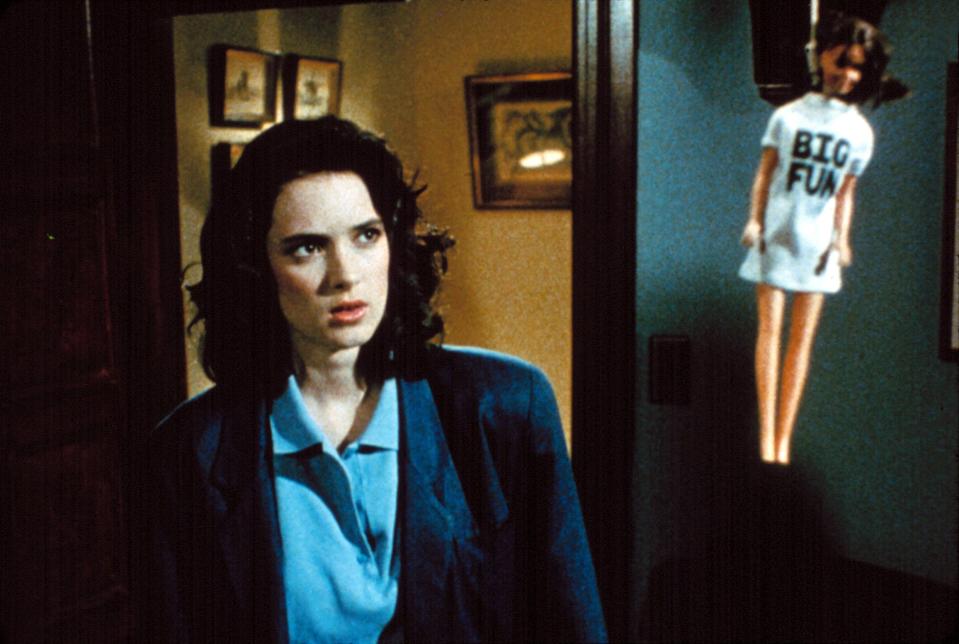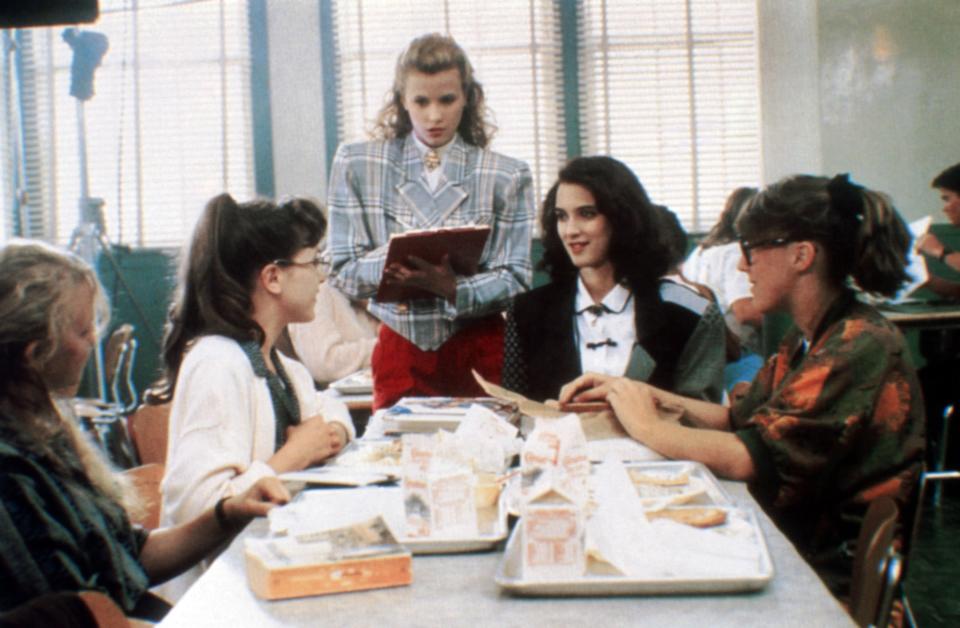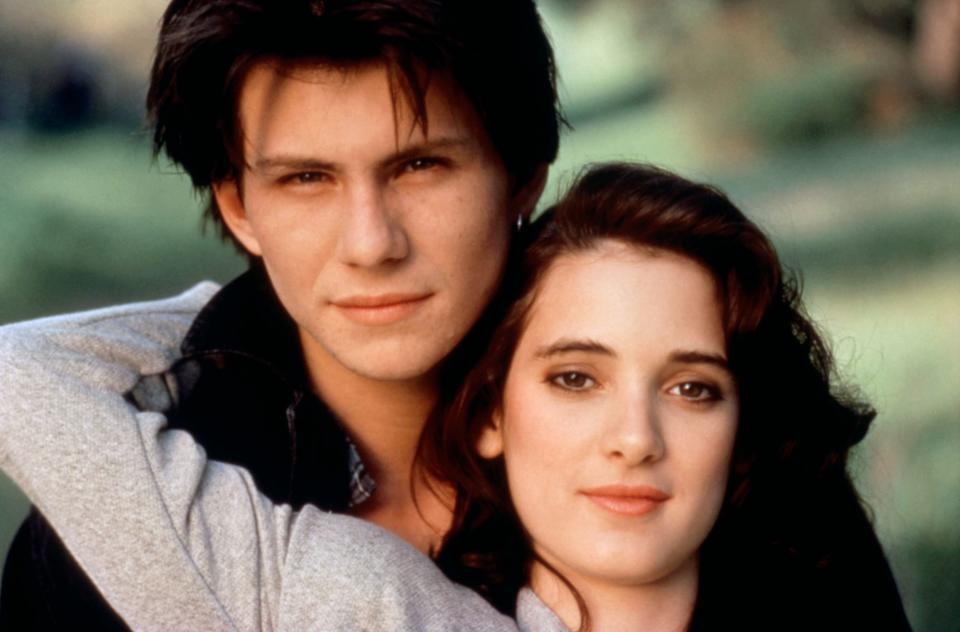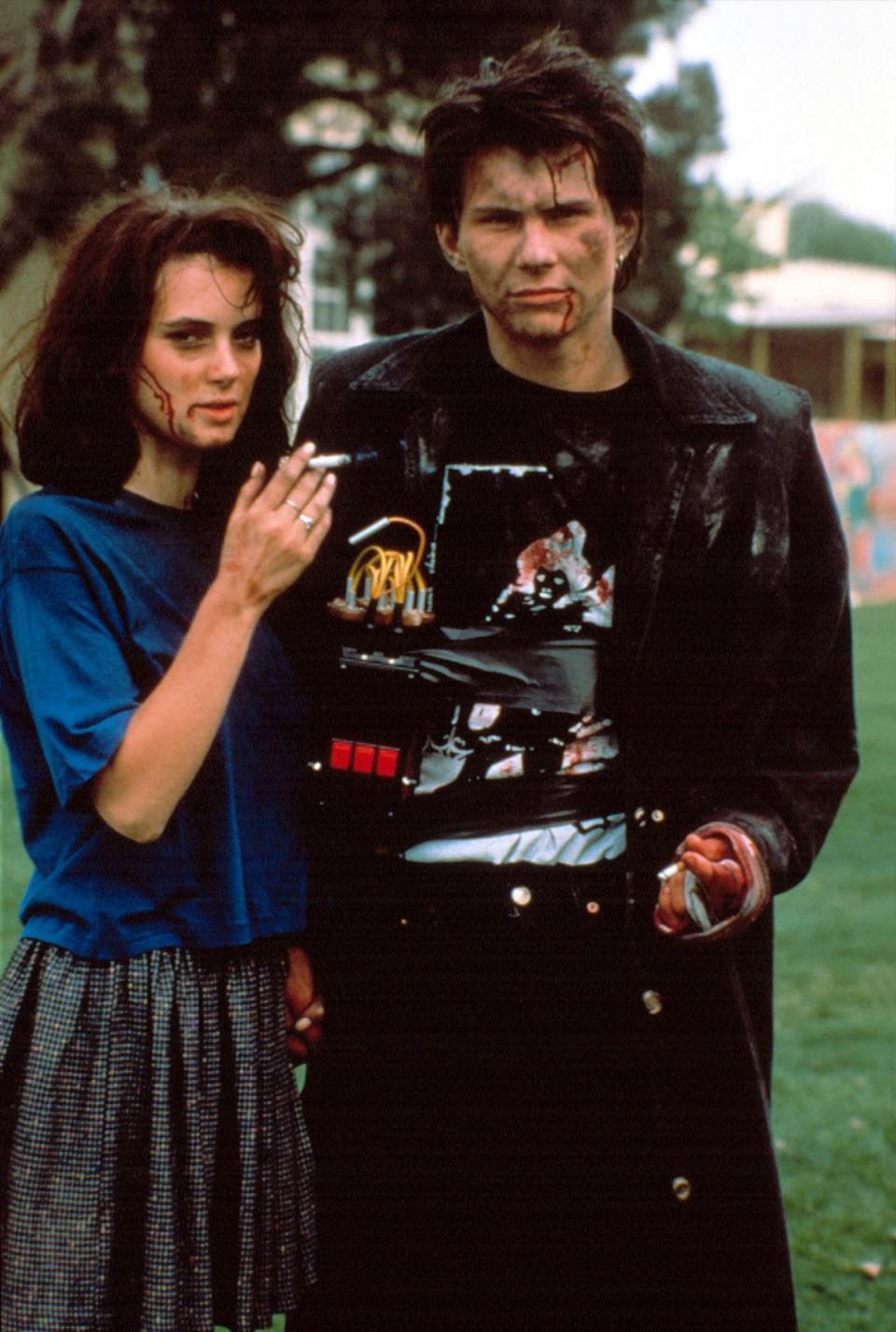Everything You Didn't Know About Heathers
When Heathers premiered in March 1989, it was unlike any other teen movie that had come before it. The story centers on a group of popular girls, all named named Heather (Shannen Doherty, Kim Walker, Lisanne Falk), and their other best friend, Veronica Sawyer (Winona Ryder), who love croquet, lunchtime polls, and being incredibly bitchy. Then, Jason Dean, better known as JD (Christian Slater), arrives on the scene and shakes things up in a literally murderous way.
The film makes cutting social commentary about teen suicide, sexuality, bullying and so much more. It's dark and twisted and funny all at the same time. That irreverent tone, along with famous lines like "What's your damage?," "Fuck me gently with a chainsaw," "I love my dead gay son," and "How very," have etched its place in the cultural landscape forever. It also helped turn Ryder and Slater into even bigger stars.
Below, we chatted with director Michael Lehmann, screenwriter Daniel Waters, and Falk, who played Heather McNamara, a.k.a. the nicest Heather, about their experience making the iconic film.
On its highly original premise, dialogue, and tone
Falk: "I'd never read anything as the subversive and kind of dark as this. I pretty much was like, 'Give me any role in this movie. I just want to be in this movie. I think it will be something that is completely different to anything that's existing,'—and I guess I was right."
Waters: "I think that the way Heathers turned out to be Heathers is that I was naïve. I think naiveté is one of the most underrated things a writer can have because I think today's writers are a little too savvy of what's selling, what's hot right now, what do you have to do to write your first screenplay. Back then, I just wrote the movie I wanted to see and that's what Heathers became and I think a lot more people should go back to that. Stop thinking about what the effect is going to be on society and whether I can do this movie or not. Just write it."
Falk: "We do have the famous story where Shannen came out of the test screening and said, 'I didn't realize we were making a comedy' because all of us in the cast and crew were laughing. And she really didn't know—I mean, she was 17 years old. She's admitted that herself, apparently.
On its lasting appeal
Waters: "I'm impressed by how it's still relevant, how it still leaves a mark on people, but then when I see the movie, it's still got all this goofy humor to it and I'm like, 'Okay, calm down, Waters. You didn't make the greatest movie ever made, you made a really funny, moving and interesting cult film.' But sometimes I think, 'Oh my god, these people are telling me it's the greatest movie ever made. Maybe they're right.' Then when I watch the movie, it's like, 'It's good. It's good.' The movie's still the movie in the best way because it's got a certain lack of pretentiousness to it, even though it's dealing with a lot of big things."
Back then, teen films were too coddling to teenagers. What if you made a movie that was the way you really feel? That your heart doesn't die when you grow up. What if you made that movie? I think a lot of times, people today say the message should be, 'Everything's going to be okay. It gets better.' I think the reason a lot of people come up to me all the time and say, 'Heathers is the movie that got me through high school' is it doesn't say that. It says, instead, 'Hey you're right to be thinking that this is the most terrifying experience you'll ever go through. You're right to think this is going to infect your whole life.'
You're right to think high school is dark and twisted.Thankfully, most of us didn't have to go to war, but we all went to high school. We didn't all go to college, we didn't all get jobs and get married, but we all went to high school. So it's this common experience, this common battleground that we can all point to our different scars on our body. It's something I'm still fascinated by."

HEATHERS, Winona Ryder. 1988, © New World Pictures/courtesy Everett Collection
©New World Pictures/Courtesy Everett CollectionLehman: "Well, it's funny, it's changed a few times because it meant one thing when it came out and then it had a little afterlife, which was fun. It was a little nostalgia for the late '80s, maybe in the '90s, and then there was a time where I thought, 'This is ridiculous. This is like watching a really old movie about teenagers.' It's just fun because it's funny to see the styles. And that's still true, but in a way the dark humor of it has come back around with bullying and things like that in a way that is a little surprising. And so, for me, what changed is that we were making fun of styles and fashions at the time. But that's become a little bit more amusing and more layered because the fashions come around and go away and come back again."
On the possibility of a sequel and if the movie could even have existed today
Waters: "Well you know, it's the one thing I've got going for me. At least I got one movie that's still alive and relevant after 30 years, why would I ruin it by making a disappointing sequel? Anyhow, it's funny the question of, "Do you think the movie could be made today?" is always kind of amusing to me and Michael Lehmann because it's not like it could really be made then either. It was kind of outrageous for its time. I think it'd probably be more outrageous now."
Lehman: "So with the cliques and that sort of stuff, it's weird. You would think that would transform in the modern world. We made this movie before people had cell phones and any of the modern social media, but they did a lunchtime poll rather than a social media thing. So the essential social structure of high school has stayed the same. But the humor that is dark and biting and ironic about the way people treat each other in high school and the way people treat each other as a group...those hold up pretty well. And in today's world, where everybody's so mean to each other and things are done so publicly, there's so much public humiliation, it seems to even have a stronger modern feel."

HEATHERS, Kim Walker (standing), Winona Ryder (seated facing front), 1988, © New World/courtesy Ever
©New World Pictures/Courtesy Everett CollectionLehman: "My take is that this is not the kind of movie that lends itself to a sequel. If somebody had a great idea on how to do it, I would love to do it. I'd never had so much fun making a movie, never had such a great group of people and such a terrific group of actors. And Dan is a genius writer. But this is not like Iron Man, let's send him out and put him through some different adventures. This is a very self-contained movie. At one point, Winona wanted to do a sequel set in Washington D.C. and that was kind of an interesting idea. We never figured it out."
On two of the movie's inspirations: John Hughes and Stanley Kubrick
Waters: "I'm an old man now, but this came to me in the midst of all the John Hughes films which are still watched today—and I enjoyed those movies immensely—but it was kind of like, they came to be all the same. It's all the parents' fault, kids are great and we all secretly love each other. I knew there was another movie out there and my favorite director at the time was Stanley Kubrick. So I was like, "Okay, Stanley Kubrick's done a science fiction movie, he's done a horror movie, he's done a period movie. What if he did a teen movie, what would it be like?" I wanted to make the Dr. Strangelove of teen films. I wanted to make a teen film that, yes, touches on everything everyone's going through in high school, but at the same time, takes a step back and has kind of a dark humor sensibility, because I think that was what was missing."
On casting and cow-tipping
Falk: Winona and Christian Slater were cast first and then the Heathers. And then once we were off, it all happened in a very short timeframe. I think the auditions were in January and they were shooting within six weeks or eight weeks. I remember that we had a dinner all together so we could all meet as a group and everybody was there. And Christian Slater was dating Kim Walker, who played Heather number one, Heather Chandler. Then, the first day of the shoot we shot the scene where we're playing croquet in Veronica's backyard—all the Heathers and Winona.

HEATHERS, Christian Slater, Winona Ryder, 1989. © New World Pictures/courtesy Everett Collection
©New World Pictures/Courtesy Everett CollectionFalk: "It almost felt like everybody was in character instantly. For me personally, I had the biggest connection and closest friendship with Winona and we had like, I don't know what it was, it was a joke one of us made or something. And then Kim was a little aloof and she was more with Christian, so they kind of went off when they weren't shooting to hang out together. Shannen was also in school as well, so she would come on the set and do her bit and then go back to school.
When we did the cow-tipping scene, it was a night shoot in Griffith Park in Los Angeles. It was a small budget movie so we had two outfits that we were wearing that could get dirty. We had to practice throwing the cow mud and it was very sad. They practiced on our stand-ins and I just remember that we were standing there, feeling kind of guilty, I'm like, "Oh, they have to practice on them to get all the hair and makeup done." They got it really right the first time and it went all in our face and in our hair and our mouth and our eyes and we were just covered in this mud. It was pretty funny—maybe you had to be there."
On the famous line: "Fuck me gently with a chainsaw."
Waters: "I have to give credit to a friend of mine in college. There was a British expression, 'Fuck me gently.' So he would say, 'Fuck me gently' and then he turned it into 'Fuck me gently with a crowbar.' I always remembered that line and then I thought crowbar was a little too masculine, so chainsaw had a more feminine feeling to it and I changed it to chainsaw. I have this ability—I guess it's stealing—but I remember everything from real life like people talking on a bus. When I was a camp counselor, there was a little camper girl who always used to say, 'What's your damage?' She's probably a 40-year-old woman now in Toronto, like, "What the hell? How did this guy read my mind?"
On why they chose croquet as the clique's hobby
Waters: "It's funny because a lot of people today think, 'Oh, were all the teenagers playing croquet in the 80s?' Like, no. It was never a thing. Kurt Cobain didn't kill croquet. It was never a thing. It was always, to me, just very visual and had a feeling of aristocracy. Croquet's much more interesting than Twitter. Like now, these conversations, even in my brother's movie Mean Girls, literally we have blips on a screen instead of like, 'Hey, let's not go to technology, let's keep it all playing a game. A rather cutthroat game too—it blends in thematically.'"
Lehman: "Well, croquet is a traditional, very, very staid game played by rich people. So, on the one hand, it's an example of how much a part of the elite of this small town that these people are—and that's kind of amusing. But then croquet as a game, it's a genteel game, but you have the choice when you play it to be really mean or just sort of playing along. So it's a great metaphor for the way things are plotted, provided, fantastic color coding for our girls."

HEATHERS, Winona Ryder, Christian Slater, 1989. © New World Pictures/courtesy Everett Collection
©New World Pictures/Courtesy Everett CollectionOn the alternate ending
Lehman: "We were going to blow up the high school at the end. It's probably good that we didn't. This was in the days before high school shootings and that sort of thing. Nobody really predicted that. So that puts a dark pall over certain elements of the movie. There was no way that could have been predicted. We weren't calling for that. But maybe today I would say anything that leans in that direction, that would lean anybody to think we were endorsing that, would be bad.
In the original script, JD blew up the high school and it ended on a prom in heaven. And the head of the studio that financed the movie said, 'I'll make this movie and I'll let you put in all sorts of dark stuff and I won't restrict you too much, but if you insist on blowing up the high school at the end, I won't make the movie.' So we backed down because we had nobody else. Nobody else was willing to pay for this one."
On favorite scenes
Lehman: "I have two personal favorites. One I think a lot of people share, which is when Heather Chandler crashes through the coffee table. And it's not so much the crashing through the coffee table, but the scene that immediately follows where JD and Veronica write the suicide note. I've always really liked that scene. But the other is the one in the car after they've killed the jocks where she lights her cigarette off the palm of her hand. And that one tends to get overlooked because it's in a weird way a little subtle. But we set a rig so that she literally without cutting, went from burning her hand with a lighter to sticking a cigarette against it and having it get ignited and it just cracks me up every time."
On Winona
Lehman: "She was really, really, really good to work with. She was 16 years old, whip smart, very aware of what the movie was about, and completely invested in the film. She came to the set fully prepared, really enthusiastic, totally into it every day. And that's not entirely unusual, but it's pretty rare for somebody to be that rah-rah about the film. And she was just so into it and I thought, 'She's terrific in the movie' and it was a big step up for her as an actor and she really filled it well. My dealings with her on the movie were across the board, positive. She was never resistant. She was never in a bad mood. She was never unprepared. She was always game and she would have complained if we ever tried to pull back on anything. She was invested in making the full-on dark version."
The Heathers 30th Anniversary Limited Edition Steelbook Blu-Ray is now available.
Originally Appeared on Glamour

